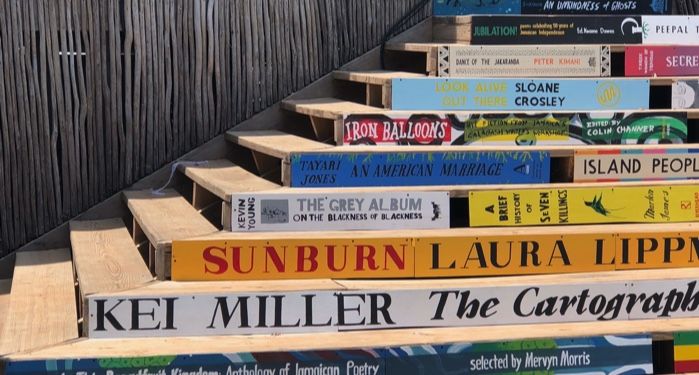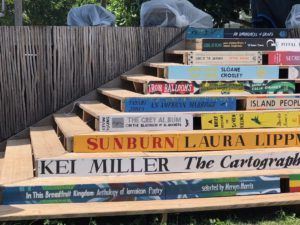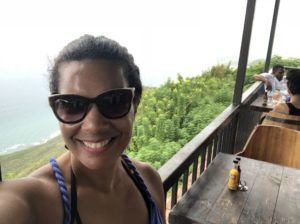
I Read My Way Out: My Year of Reading Copiously and Therapeutically
For me, 2019 was a year of reading copiously and therapeutically. In the beginning, there was no plan. I just knew I wanted to make my time reading count in some way, to grow and make things better somehow. 2018 had been a rough year. By the summer, I was no longer teaching, and the time had come to regroup.
That kind of change is often scary. But when it finally came, this transition felt like a relief. I was leaving a city I had lived in for the seven years, but still never fully felt at home in. Letting go of teaching (at least temporarily) was harder. My work is inherently political and I care about it. It involves teaching, research and writing about race, gender, and sexuality and our political system. It was always hard, but also rewarding. I like the university setting, and I loved my students. I love class discussions and working one-on-one.
In 2016 and after, however, facing those issues every day in the Trump era was…especially difficult. That’s an understatement. Prior to becoming a professor, I had spent time working on election campaigns and with progressive political organizations, and was still reeling not only from the electoral losses in 2016 but also from the fallout that we see everyday, the unrelenting backlash against people of color and other marginalized folks.
By 2017, I was struggling to be productive in my academic writing even though it was the time I most needed to be. The project I needed to advance was stalled. I felt isolated, depressed, and anxious. I needed a timeout.
So, I took one—I left the Northeast and landed in Florida. Well, first I escaped to Jamaica (where I was born) for several months. My first weekend back, I attended an incredible, inspiring Calabash literary festival. Over the next few months, I read poetry and novels, drank rum, climbed a waterfall or two and reconnected with close friends and family. It was a start.

The author, Carole Bell, and friend Kellie Magnus at Calabash 2018.
And then I moved to Florida to refocus and plot my next move. There I recommitted to and recommenced work on my first book, a study of racial politics and Hollywood film. Still, I found myself feeling untethered without a fixed work schedule. I was struggling to write in the day and watching television and following the political news in my spare time every evening, and it started to feel like my brain was atrophying rather than recharging each night. What’s worse, my attention span was still all over the place. The news was too much, and the pop culture I had long counted on was either ending (Crazy Ex-Girlfriend) or no longer felt like comfort (this may have been right around the time that Game Of Thrones was winding down its final, rather unsatisfying season, but I’m sure that’s a coincidence.)

Stairway at the Calabash decorated with cover images and titles from featured books.
At that point, I decided to read more and watch less. And that seemed to help. So then I watched even less. And, eventually, I stopped watching television altogether. I also took a vacation from Facebook and Twitter. Plus—and this was by far the biggest adjustment—I tuned out for the first time in my adult life, from politics. Entirely.
With those changes, my year of reading copiously had begun. But even then the formula wasn’t quite right. At times what I was reading soon started to feel as empty as the television it replaced. So I made some goals to help focus my reading for best effect.
Those goals evolved over time, and eventually a roadmap of sorts emerged from a few core objectives. With a few adjustments, my year of reading copiously turned into a year of reading intentionally and reading as self-medicating and self-soothing, but also exercise. Books were healing, therapy as much as escape (the mental health benefits of reading fiction are well documented). In April, Sally Rooney released Normal People, and it was a revelation and inspiration. I read it three times in as many days.
At the same time, I discovered that I love reading and writing about romance in particular. I’m not alone in my admiration. A lot of people are reading romance therapeutically these days. Once I started talking about books online I discovered an incredibly vibrant and active community.

The author at Lover’s Leap in Saint Elizabeth, Jamaica.
For me, Jasmine Guillory was a gateway drug. I quickly moved onto deeper cuts, discovering the joy of contemporary authors like Christina Lauren, Kennedy Ryan, and Alexa Martin, and devouring the back catalogs of historical romance legend Lisa Kleypas and Eloisa James and newer, more explicitly feminist authors like Sarah MacLean, K.J. Charles, and Cat Sebastian. Then, Red, White and Royal Blue came out in May, and was so thoughtful, joyful and meaningful, it was a key reason I revived my long dormant blog.
In the end, I read 403 books in 2019, not counting the few I abandoned or partial reads of the academic books I read select chapters from for research. I also wrote 50 book reviews, sent one to a popular blog and had it accepted it for publication. The bottom line: I had been in a funk, and I read my way out. Reading is no substitute for therapy. And I did some other things along the way like find a critique partner and a writing coach, train for a half marathon, and run my best time. But as it had on other occasions before, the biggest internal change began with books.
In the spring of 2019, however, the journey began with one simple intention: read at least four good books a month, definition to be determined. Eventually a quick and dirty rule of them was to include two works of notable general fiction, literary fiction, or nonfiction (genres I genuinely love but didn’t automatically turn to everyday).
In July I updated that to:
- Read one good book a week or four good books per month from my TBR list, articles, and other recommendations, regardless of genre (by then I had also begun to keep copious notes).
At each step, my objectives became more ambitious. By the Fall, I had pledged to:
- Write reviews of books for writing practice
- At least one review a week
- Review the majority of the advance review copies of books I download from NetGalley and Edelweiss within one month.
By the end of the year, I was reading a book a day and approaching the selection of said books with a ferocious, strategic intent. I made lists within lists. I created categories and subcategories with relevant authors: queer romance; literary award winners; mystery/thriller award winners; romance by women of color. And I wrote about it all, every day.
By December, my reading life was finely tuned. I realized it wasn’t about a specific genre or category. My objective was to read books that could do at least one of the following:
Elevate my mood
- Read emotionally satisfying books that enhance my mood by virtue of their goodness.
- These tend to be books that mirror my social values—they model hope, love, joy, and equality, which makes me smile, laugh and have hope myself.
- I often list mood last, but if I’m honest, it’s essential. A lot of the time this means romance. I can’t emphasize this enough. Read more romance.
Expand my mind/horizons:
- Read books that educate and enlighten me in some way about the world
- Decolonize my reading list: read fewer books from/about dominant white culture.
- Read books that are diverse in terms of authorship, subject matter, genres.
Reflect my values:
- Beauty/artistic excellence
- Social significance
- Cultural and sexual diversity among characters
- Cultural and sexual diversity among authors
The Payoff and the Road Ahead
That worked for me. I used these guidelines to chart a virtual roadmap filled with authors and books to put me on a better path. My mood grew a little better, and with journaling as a jumpstart, my writing got faster and stronger.
Looking ahead for 2020, all the ideas from 2019 will carry over in principle except I’m adding more concrete tasks.
- Read at least two “great” books a month.
- Read different—choose at least one book outside of my daily staples. That could be:
- Romance sub-genres I haven’t or rarely read—like paranormal and sci-fi
- Nonfiction
- Literary fiction
- About a group of people I’ve never read about before
- Read less and write more. Write one review a week.
- Review the majority of ARCs I download before their pub dates. Related, don’t browse or download ARCs I don’t have time to read and review. When you’re an addict looking to recover, you don’t hang out in a Crack Den. Books are my crack. NetGalley is the den. I’m trying to limit exposure.
- If a book is truly bad or simply and clearly not for me, just stop reading.
That last rule is essential. In the end, that’s what the year of reading copiously was about: finding what was for me and what was not. And so, I found my way through reading. I even rediscovered the joy of writing.
Four hundred and three books later, I had read my way back.
Breakthrough Books
Here are some of the books that got me here. This represents approximately 5% of what I read in 2019. Each one made an impact.
- Normal People by Sally Rooney
- Red, White and Royal Blue by Casey McQuiston
- Work for It and Get a Life, Chloe Brown by Talia Hibbert
- The Great Believers by Rebecca Makkai
- An Extraordinary Union by Alyssa Cole
- Rebel Hard by Nalini Singh
- Long Shot by Kennedy Ryan
- American Fairytale by Adriana Herrera
- The Witch Elm, The Secret Place, and all of the Dublin Murder Squad series, by Tana French
- The Flatshare by Beth O’Leary
- Lord of Scoundrels by Loretta Chase
- Indigo by Beverly Jenkins
- Think of England, Unfit to Print, and An Unnatural Vice by KJ Charles
- Her Every Wish and The Suffragette Scandal by Courtney Milan
- The Kiss Quotient by Helen Hoang
- Pride, Prejudice and Other Flavors by Sonali Dev
Further Reading
To read more about books as therapy see:
















